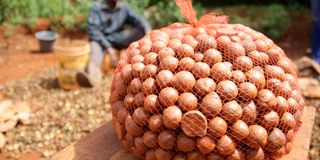
A farmer sorts macadamia nuts at his home in Ichamaara village in Nyeri County on June 30, 2023.
On February 24, 2025, Josphat Muriira, a macadamia farmer in Meru County, harvested one tonne of his produce.
With the prevailing price of Sh150 a kilo offered by Chinese importers, he expected to earn at least Sh150,000.
Then came the bombshell. Three days later on February 27, Agriculture Cabinet Secretary Mutahi Kagwe reinstated the ban on raw-nut exports and the prices tumbled to Sh90 a kilo.
“I have lost Sh60,000 just like that,” Mr Muriira, the chairman of macadamia farmers in Tigania West said in an interview. “The ministry should at least have given us a notice so that we try to avoid the losses. When we invested in our farms, we did not know it was a matter of gambling.”
This is the plight of many farmers in macadamia growing areas of Meru, Murang’a, and Nyeri counties.
The growers were relying on a windfall that started in November 2023 when the ministry lifted a ban on the export of in-shell nuts imposed in 2009.
The export window was effective for a year but was extended for three months when it expired in November 2024.
Mr Kagwe said the government would strictly enforce the ban in line with the Agricultural and Food Authority (AFA) Act and the Oil Crops (Nuts and Crops) Regulations of 2020.
“We urge farmers to register under the Kenya Integrated Agricultural Management System (KIAMIS) to enhance planning and ensure they receive the necessary support,” he said.
After the reinstatement of the ban, the sub-sector now faces a fresh shake-up with local processors hailing the move even as farmers and Nut Traders Association of Kenya (NuTAK) say they were caught off-guard.
While some traders warn of falling prices, processors insist the move will rejuvenate a struggling sector, with the government keen on value addition aimed at creating jobs and boosting revenue.
Agriculture and Food Authority (AFA) Director General Bruno Linyiru said brokers buy nuts from farmers at Sh70 per kilo but resell the produce at as much as Sh150 to processors thus exploiting farmers. He stressed that the major challenge in the market is the role of the intermediaries.
“We plan to address this issue in the next financial year by forming cooperatives to help farmers secure better prices for their produce,” Dr Linyiru said.
Government officials argue that without the ban, it would be impossible to regulate harvesting, exposing farmers to losses due to premature harvesting.
Poor harvesting practices such as shaking of trees to collect immature nuts have negatively impacted both quality and future yields.
Mr Benard Sitati, treasurer of the Macadamia Nut Association of Kenya (MACNUT), which represents processors, explained that due to demand, some players resort to unorthodox methods of harvesting.
“Macadamia nuts should naturally fall from the trees during harvesting season. However, many farmers rush to sell to brokers leading to the collection of immature nuts,” he said, adding that these rejected nuts end up being resold to local processors, further complicating market stability.
Mr James Karanja, Batian Nuts Limited managing director, said when brokers buy nuts from farmers, they select the best quality.
“The Chinese absorb 60 per cent of the produce leaving 40 per cent which brokers mix with the nuts they sell to local processors which compromises quality,” Mr Karanja said.
NuTAK has proposed a quota system similar to South Africa's where 30 per cent of nuts are exported raw while 70 per cent is processed locally.
However, Mr Sitati argues that Kenya’s production volumes are too low to sustain such a model, instead advocating for increased output to benefit all stakeholders.
Mr Linyiru said the government had initially allowed a one-year window from November 2023 to November 2024, to stabilise prices amid global market fluctuations.
The export ban remains contentious in Meru and Embu where farmers insist that without Chinese buyers, prices have suffered. Discontent first surfaced in 2023 when farmers began protesting the drop in prices.
“In 2019, processors paid farmers as much as Sh230 per kilo. The number of processors increased from five to 15 despite low production levels. However, by 2023, a global oversupply caused by the Covid-19 pandemic disrupted the export of processed nuts, leading to the loss of over 20,000 jobs,” Mr Sitati said.
Processors argue that direct sales to them would secure better prices for farmers, with a minimum farm-gate price set at Sh100 a kilo.
However, Kenya’s fragmented macadamia industry consisting of over 200,000 small-scale farmers makes aggregation difficult compared to South Africa’s estate-based model.
“Chinese traders receive rebates of up to 25 per cent when exporting raw nuts, allowing them to offer brokers higher prices. Unfortunately, these benefits don’t reach farmers and stifle local industry growth,” Mr Sitati said.
In response, AFA has established a multi-stakeholder Macadamia Nuts Standing Committee to oversee policy implementation.
The government has also pledged support through extension services, subsidized fertilizer programs, and real-time market information.
At an annual production of 45,000 metric tonnes, Kenya ranks fourth globally in macadamia production behind South Africa, Australia, and China with experts warning that continued instability could jeopardize its market position.
Market access remains a challenge, particularly in the European Union where Kenyan macadamia struggles against higher-quality competitors. Industry players are now pushing for a Kenyan macadamia brand to enhance global recognition.
As the 2025 harvesting season begins on March 1, all eyes are on the sector to see whether the export ban will deliver the intended benefits or deepen the challenges facing farmers and processors.
The Centre for the Promotion of Imports from Developing Countries recommends strengthening extension services and distributing high-yield seedlings tailored to Kenya’s macadamia-growing regions.









